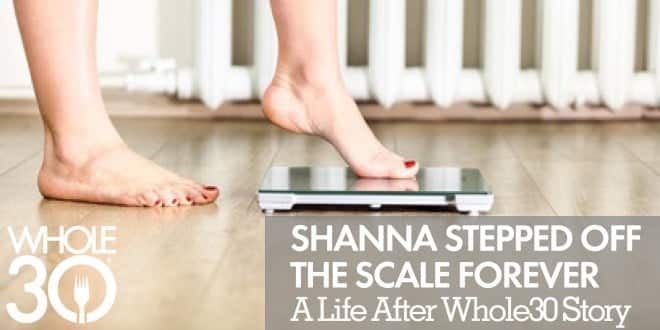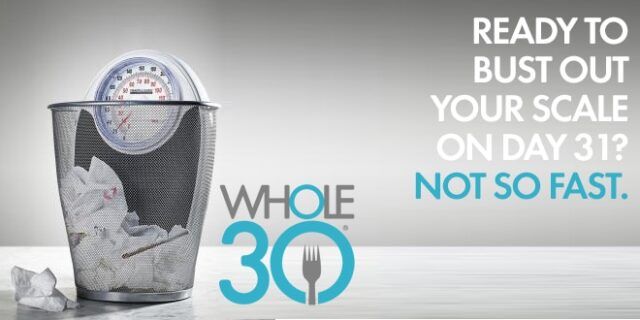by Whole30 team member Shanna Keller. This post is part of our ongoing series of posts related to life after your Whole30. If you’d like to submit a Whole30 post for consideration, contact content@whole30.com.
A few days after my fourth Whole30, I quit weighing myself. To an outside observer, my decision to ditch the scale might have seemed impulsive, made in a split-second and spurred on by an unexpected text message from a friend. But it was actually a moment of decisive clarity made possible by several Whole30s and an ongoing commitment I’ve made to developing habits in life after the Whole30 that support my physical and emotional health and relationship with food.
The Moment I Let Go
I was standing in my bathroom, distraught over a number spelled out in red digital block lines. If you have a negative relationship with the scale, you know how this goes. Mornings start with anxiety and trepidation about the number that flashes up at you shortly upon waking (after going to the bathroom and before getting dressed). If the number is lower than you expected, you’re elated. If it is higher, you’re defeated. I voluntarily hopped on this emotional roller coaster every day at 7AM.
On this particular day there was another layer of frustration and shame. I knew that by weighing myself I was undoing the healthy mentality I just spent 30 days cultivating by focusing on non-scale victories as a better measurement of health. (Click here to read Melissa Urban’s tough love advice about weighing yourself after a Whole30.)
I had a list of victories that covered everything from the way my clothes fit (fantastic) to quality of sleep (amazing) to stamina and sustained energy (no more 3 PM slump). Yet there I was, hopping right back on the scale and allowing it to dictate my value and self-worth. I knew better, but I wasn’t choosing to do better. I was mad about the number, and mad at myself for being mad about the number.
Who Cares?
Looking for someone who was willing to indulge my emotional funk, I texted a self-deprecating message about my weight to a friend.
Her exact reply, verbatim: “Who cares?”
This is a good friend. If you don’t have a friend who’s willing to call you on your self-centered wallowing, you should find one. And because she is a good friend, she quickly followed up her first message with a second, gentler one. “You’re a healthy eater, exercise every day, and take care of yourself. The scale is kind of stupid. Why does it matter what you weigh?”
Her response stunned me into action. I remembered that the number reflected on my scale had very little to do with my overall health and well-being. Where else had I heard that lesson? Oh, that’s right—from the Whole30, the same program I just spent the last 30 days completing.
Her text was the last push I needed to switch my mentality from one of self-pity to one of empowerment. She was right. No one cares. No one else knows about, sees, or interacts with that number on a daily basis. I’m the only person who does. And I have the power to stop, right this very second.
I already knew that my weight is simply the measurement of the gravitational force of the earth on my body, but that day I committed to believing it. My weight isn’t an indicator of my potential, my worth, or my ability to give or receive love. It doesn’t say anything about how smart, talented, or kind I am. My weight doesn’t measure my ability to be a good wife, sister or friend.
If weighing myself daily had the power to jeopardize my self-concept and the effort I put towards improving in my health, habits and relationship with food, I could just quit weighing myself.
That was in April of 2015. I have not stepped on a scale since.
The Scale Doesn’t Measure Health
This is the primary message that the Whole30 rules communicate about weight: “This is about so much more than just weight loss, and to focus on your body composition means you’ll miss out on the most dramatic and lifelong benefits this plan has to offer.” (Check out Step Seven to read more about why you aren’t allowed to step on the scale during a Whole30.) Throughout my multiple Whole30 experiences, I followed the “don’t weigh yourself” rule and enthusiastically tracked my progress through non-scale victories. I am nothing if not an A+ Whole30’er.
During each round of Whole30, I permanently adopted more healthy habits. By the end of my fourth time through the program, I was happily leaving cream out of my coffee, saying “no thank you” to foods that weren’t worth it, and following the Whole30 meal template for the majority of my meals. But I wasn’t ready to let go of my daily weigh-ins yet. If I didn’t know how much I weighed, how would I know when it was time to do another Whole30?
I knew it was twisted logic, but it was my twisted logic. So I continued to submit myself to a daily ritual that caused me stress and anxiety. Until eventually, after I had invested in my health long enough, I came to the place where I understood that the habit wasn’t actually serving my greater goal of a healthy relationship with food, and I finally had the strength and courage to give it up.
Herein lies one answer to a Whole30 question we get a lot. If the Whole30 can change your life in 30 days, why do some people do it more than once? I needed more than one because my health, habits and relationship with food required a lot of changes, and I wasn’t ready to make all of them after my first Whole30. (Fact: most people aren’t, and that’s okay.)
Let Us Be Your Friend
If you are in the place where I was last spring, walking into your bathroom every morning with panic and fear, knowing that a number that pops up on a flat hunk of plastic is going to set the tone for the rest of your day, let me be your friend:
Who cares?
And because I try to be a good friend, let me follow it up with some gentler advice:
Trash your scale. Imagine waking up every morning and not feeling anxious about stepping on the scale. Sounds like a nice way to start the day, right? If you’re ready to admit that simply not weighing yourself is the right choice for you, get rid of your scale. Actually remove it from your house. Make room physically and mentally for more self-confidence, respect and love. Give the scale away. Better yet, set it out on the curb for trash pick up this week. There’s no need to pass it along to someone else.
Accept that your weight is not a very good indicator of your overall health. Make a list of non-scale victories and post it somewhere you can see it daily. A few of mine are: fitting comfortably into my jeans, regular progression in my yoga practice, an under-control Sugar Dragon and deep and restful sleep. If I notice a negative change in any of those factors (Wow, I’ve had uncontrollable sugar cravings all week) I know exactly what I need to do to get back on track. My weight isn’t even a consideration.
Phone-a-friend. You know that one friend who will be brutally honest with you? Text him or her now. Say that you’re ready to give up your scale, and ask for their encouragement and support through the process. Give them permission to use a little tough love if necessary. Don’t have a friend you can ask to do this for you? Come on over to our Facebook page or Instagram feed. We’ll be your friend.
Cultivate a more loving relationship with your body. When I have a negative thought about my body, I try to immediately replace it with a positive one. My body is healthy, strong, and capable of balancing all of my weight on my forearms (thanks, yoga!). That’s a lot to be thankful for, and there’s no need to hate on it because it doesn’t exactly match some idealized body type that I have in my mind. This is still a work in progress, but not knowing my weight helps.
Since I permanently stepped off the scale, my mornings are a little easier and my feelings toward myself are more consistently positive. I have a little bit more mental space for positive thoughts. It’s not perfect, but it’s nice. More peaceful. I wish the same for you, and I hope that through your Whole30 journey, you find it.















